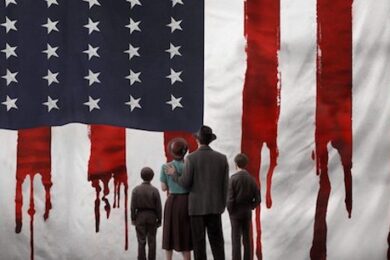Originally published during George W. Bush’s second term in office, Philip Roth’s The Plot Against America, posits an alternative 20th Century history in which the 1940 presidential election is won by the aviator, Nazi sympathiser and America First spokesman, Charles Lindbergh, rather than Franklin D Roosevelt. Told from the perspective of New Jersey family, Herman and Elizabeth Levin and their two sons, the story progresses slowly but masterfully portraying the insidious creep of suspicion then hatred towards the Jewish community, enabled by a president who makes such feelings appear acceptable to an increasing majority of ‘patriotic’ American citizens.
Initially portraying himself as anti-war rather than anti-Semitic, Lindbergh makes shrewd use of southern rabbi, Lionel Bengelsdorf (brilliantly portrayed by John Turturro), to assure the Jewish community of his "good intentions". Elizabeth Levin’s sister, Evelyn Finkel (Winona Ryder), becomes romantically involved with the rabbi and occupies a high-ranking position in a programme which sees Jewish children sent to live with ‘real’ American families in rural states. Finkel is clearly enamoured of the idea that the rabbi "has the president’s ear", whilst Bengelsdorf’s considerable ego and gullibility make him an easy mark. Azhy Roberston is brilliant as the wide-eyed, younger Levin boy, Phillip. His Nazi-induced nightmares and a development involving a neighbour’s boy, Seldon Wishnow (Jacob Laval), offer some of the show’s most poignant moments. The acting is impeccable, the period detail utterly beguiling and the relevance to our current era is repeatedly and effortlessly made evident.
Speaking in a recent interview, David Simon admitted that when he was first approached to film an adaptation of the book, he couldn’t see a reason to do it. Obama had been re-elected and the alternative history of Roth’s novel seemed at odds with the way America’s political future was moving. Then Trump was elected in 2016, with his followers chanting “America First”, and he then saw Roth’s novel in a different light. Trump is clearly not cut from the same cloth as Lindbergh (who was viewed as a hero by many for his historic, solo transatlantic flight), and the 1940s is a very different era to our current time, but the parallels between the isolationism and xenophobia of the current American administration and Lindbergh’s are undeniable.
I sat watching an early episode with my wife recently, which contained a scene in which Herman Levin (Morgan Spector) is verbally abused in a restaurant, in front of his family, by an aggressive male for simply being Jewish. Then the next morning, when I turned on Twitter to begin scheduling the first of the day’s tweets for this site, the very first thing I saw was footage of a well-dressed American man in a Californian restaurant, verbally abusing an Asian family and threatening them by directly invoking Trump’s name. Certainly, referring to SARS-CoV-2, as ‘Kung Flu’, makes Trump disgracefully complicit in normalising this kind of attitude.
By filtering the story through the perceptions of several family characters of varying ages and viewpoints, from events that might initially seem banal through to the crushing events of later episodes, Simon cultivates a powerful empathy from his audience. When Phillip enters a cinema with his father to watch newsreels of the war in Europe, his protests of being able to handle such information are throw into stark contrast with the emotionally wrenching expression that appears on his face as he slides down in his seat to avoid the big screen’s gaze. When Herman repeatedly refuses to consider the option of moving to Canada, rightly arguing that America is his country, we feel his strong emotional response and also that there may still be time to make that decision. By cleverly advancing the timescale of the story’s events, by some months, or even a year, at some points, we feel, along with the Levin family, the inexorable closing of fate that renders some decisions no longer viable.
The direction of the story takes some exciting, unexpected turns. The ‘plot’ of the title has several, different connotations. The ‘plot’ of Lindbergh against the Jewish people. The ‘plot’ of the Jewish people against Lindbergh, which exists at least in the minds of Herbert Hoover’s G-Men and the ideologically manipulated general public. The ‘plot’ against Lindbergh by the Germans, which exists in the minds of those who wish to excuse his actions. This latter element makes inspired use of the actual kidnapping of Charles Lindbergh Jr, and leads to some very conspiratorial sounding claims made by a desperate rabbi Bengelsdorf towards the series finale. Finally, diverging considerably from the ending of Roth’s novel, the final act of the series evokes the monstrous possibility of a different kind of ‘plot’, which may yet have the most relevance of all to the current state of world events, the perspicacity of which we will all have to wait until later in the year to judge. In all of this darkness, there are also some suggestions of hope in humanity found in places one might not naturally anticipate. HBO have had a very strong run over the past two years. Last year’s Chernobyl and Watchmen were among its best ever shows. The Plot Against America is at least the equal of those two but, unfortunately for those of us living through it, is even more relevant to our current time.
The Plot Against America begins in the UK on Sky Atlantic, this Tuesday (14 July 2020)



